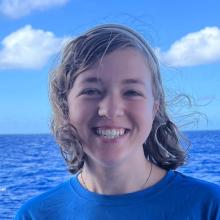
Sierra Landreth
Tell us about your work/research. What kinds of things do you do?
I am a biological oceanography graduate student at Florida State University, studying deep-sea benthic ecology and communities on Pacific seamounts. A significant portion of my time has been dedicated to analyzing ROV video footage of seamounts and identifying various animals such as deep-sea corals, sponges, echinoderms, and more! By learning more about the community composition of seamounts, I aim to explore the potential drivers that influence where animals may live. I love contributing to the characterization of seamounts in the deep sea because many areas of the ocean remain relatively unexplored. My hope through my research is to contribute to building collective knowledge of the deep sea and to advocate for the conservation of these critical habitats.
What sparked your initial interest in your career?
Growing up in the landlocked state of Arkansas, I was always fascinated by ocean animals. Every experience I had as a child in the ocean, whether visiting the beach during vacations or snorkeling in vibrant coral reefs, only deepened my aspiration to become a marine biologist. In high school, I pursued my passions and applied to several universities in Florida. After being accepted at the University of West Florida, I participated in several research opportunities to broaden my understanding of the field. I had the chance to work with a wide variety of organisms, starting with small bacteriophages and expanding to sea turtles. This curiosity about exploring new environments and ecosystems led me to consider studying the ever-expanding field of deep-sea biology.
Who influenced you or encouraged you the most?
My parents have been a huge inspiration to me in pursuing a degree in marine biology and continuing my education in a graduate program. They have always been so supportive of me and my future endeavors, and have cheered me on every step of the way.
What element of your work/study do you think is the most fascinating?
One element of my work that always amazes me is just how diverse and complex deep-sea benthic communities are. Seamounts are often very heterogeneous, which means not every seamount looks the same or has the same animals. Some of my favorite animals are the deep-sea corals I see in ROV videos, which are so vibrant and colorful, coming in an unbelievably wide variety of shapes and sizes. I find myself learning something new every day, which is exciting in itself!
How did you get involved with the Ocean Exploration Trust?
My graduate work involves analyzing ROV imagery from several seamounts within the central and western Pacific. When my advisor informed me of the opportunity to fill an empty slot as a scientist aboard the E/V Nautilus, I was excited to join in!
What other jobs led you to your current career?
At the University of West Florida, I worked as a Biology and Chemistry tutor as well as a STEM peer coach, teaching and mentoring other undergraduate students. Before shifting my focus to deep-sea benthic ecology, I was an undergraduate research assistant in the Quantitative Marine Conservation Ecology Lab studying sea turtle occupancy patterns at fishing piers. These experiences contributed to my love of public outreach opportunities and scientific communication.
What are your degrees and certifications?
Bachelor of Science in Marine Biology -- University of West Florida 2022
What are your hobbies?
Some of my hobbies include reading, drawing, crocheting, watching movies, and spending any time I can outdoors. I love going on camping and backpacking trips to the mountains, as well as taking my paddleboard out to rivers and springs.
What advice would you give someone who wants to have a career like yours?
My advice is to stay persistent, and stay curious! Some of my favorite opportunities have arisen from pursuing my passions, even in fields where I had no experience but wanted to learn more. Over the years, I’ve learned there is no harm in trying something new; sometimes, it just takes a bit of courage to take the first step.
Expeditions
Sierra participated in the following Ocean Exploration Trust expeditions:
